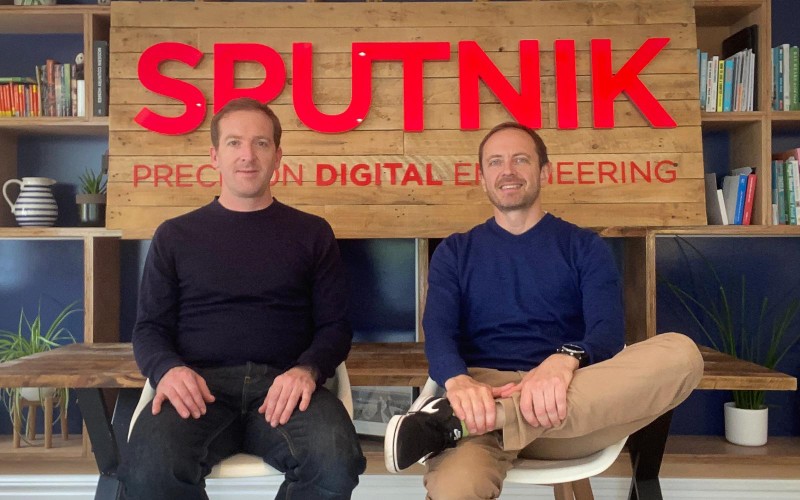Artificial intelligence has the potential to transform the human side of the insurance industry.
Despite media headlines around AIs obliterating jobs, key figures from various areas of this age-old sector agreed on the opportunity it provides to augment the human capital within organisations at a roundtable organised by BusinessCloud.
Following the session, Kiashen Moodley, director of strategic products – R&D at Vitality, told me that “it’s super important to have a champion for the human side of this discussion”.
Chicago-based Vitality offers smart technologies to build a stronger, healthier world through partnerships with forward-thinking insurers, employers and aspirational reward partners. Indeed, two of Moodley’s fellow attendees at the event in Manchester were customers of Vitality and advocates for its ‘shared-value insurance’ approach.
“They must champion what makes us unique, what makes us creative, and make sure that we don’t substitute that through technology,” expanded Moodley.
“We’ve also got to be careful that we don’t use AI for AI’s sake. It’s an important balancing act to make sure we don’t slip into that space of actually ‘here’s a solution, it works in this particular use case… let’s figure out where else we can apply it’. You have to start with the problem in mind.
“It sounds fairly obvious, but I think it is also profound – if a customer is trying to understand something about their health, there’s a very emotive journey under that. What should I be doing to eat better? What should I be doing to recover from illness?
“You cannot lose the essence of how important it is to understand the problem first and then figure out how the technology can help: for us, what that’s always meant is how do you drive those almost individualised actions to create value for a customer?”

Look before you leap
Ian Taylor (above, right) is head of CX at Bury-based tech consultancy, hardware and software provider Avoira, which has completed projects for Principal Insurance (a vulnerable customers identification tool) and Revolution Insurance (an AI speech analytics platform).
“Businesses are trying to do pockets of AI without defining the use-case,” he agrees. “We’ve been through a bit of that pain and we are really strategising now.
“We spend a lot more time talking to a business to understand their needs at the outset, rather than jumping into the swimming pool of tech too soon, before we’ve done our discovery work.
“If you understand the use-case and the data at your disposal, you can take the time to plan – and only then you’ll see the benefit.”
He added: “The key themes remain the same in insurance: avoid risk and make money! We work with our insurance broker customers to supercharge their requirements using AI – whether it’s FCA consumer duty and identifying vulnerable customers; helping their staff to sell better; or supporting their customers better to retain revenue.”

AI is not separate
Danette Copestake (above, left) is developer community lead: functions technology at New York-headquartered financial services giant Citi. Recently named one of Computing.co.uk’s 100 IT leaders for 2025, she looks to leverage emerging technologies to bridge the divide between business strategy, industry trends, technology implementation and change management.
“I think it’s really important that AI is not seen as something separate to the rest of a business,” she cautioned. “It has to become a bit like eCommerce – another extension of how we work. It almost needs to be built into the normal, common operating model of those companies.
“The biggest challenge is perhaps the prioritisation [of AI projects] and the due diligence to make sure that what people are proposing is strategic for the business.
“We must get the next generation prepared on ethics and collaboration: it’s about people, at the end of the day. AI won’t replace people: it will just give us the opportunity to be more creative.”

(l-r) Jim Larking, Andy Nicol
From cost cutting to disruption
Sputnik Digital is an innovation, UX, engineering and AI agency with 25 years of experience working with financial services clients including Swinton, GoCompare, Fluent Money and Hastings.
Andy Nicol (MD, above, right) and Jim Larking (CTO, above, left) outlined its approach to creating technical proof-of-concepts and analysing commercial viability for clients. As well as numerous projects delivered inside of client businesses, Sputnik have also built https://www.hollr.io/ and https://www.invntry.co/.
Is personalised AI video Hollr.io the future of customer renewals?
Nicol pointed out that, as well as the opportunities for efficiency through the use of LLMs to assist with tasks such drafting emails, summarising documents and answering search-like queries, there are also opportunities to leverage disruption to increase market share – for example through the use of image recognition, finding patterns in data sources, or the use of nascent improvements in quality and speed of voice recognition and synthesis.
In regulated industries such as financial services, it is often important to keep an “agent in the loop”, he said, surfacing timely and accurate data and responses to internal teams rather than providing direct contact between AI and the customer.
Additionally, recent launches of tools such as n8n, the adoption of MCPs (Model Context Protocols), and a number of new services offered by the big cloud providers means Agentic AI – the use of AI agents to perform automated tasks but without human intervention – is easier than ever to develop.
Nicol also discussed the move from SEO to GEO, where the importance of search engine results to customer acquisition is increasingly going to be replaced by the need to feature in prompt responses on GenAI platforms such as ChatGPT.

Threats
Steve Kerrigan (above) is vice president growth for UK and EMEA at Crewe-based IMS, a telematics provider helping insurers to drive engagement that improves risk, pricing, claims and safety.
“There’s lots of potential to use AI within the insurance industry to help customers – from an engagement perspective, from communication, from answering those questions that a customer might have, making their life a lot easier,” is his view. “There are also a lot of threats there – it was interesting to hear Andy’s thoughts on the move from SEO to GEO.
“From an IMS standpoint, we’re taking in data around driving behaviour and using it to explain to the customer: here’s how to drive safer, here are some tips for you. Getting the tone of voice right from a customer’s point of view is crucial: if you work with a major brand like Aviva, if you get the communication wrong, it goes to the Daily Mail and you suffer ‘brand threat’.
“Insurance models have to be bold – test and learn, test and learn, while keeping it captive. Learn before you take it out to market, and then you can start seeing the efficiencies in the right areas to bring down your costs, give a good customer experience, and use that data towards pricing.”
Short- vs. long-term
Karl Hughes heads up the AI taskforce at Liverpool-based Acorn Insurance, a specialist insurance broker. His focus in the short term is to boost workforce enablement through AI tools and “human in the loop” processes, while long-term he aims to help build scalable frameworks with early engagement from InfoSec/Data Protection and operational leads.
“You’ve got to attack both at the same time: in the short term, you get wins in place across the business so you can build confidence and the flywheel; while in the long term, you’ve just got to keep your ear to the ground. My social media algorithm is full of AI content now.”
He added: “It could be useful if companies start to build their own agent-to-agent endpoints: it could change how you interact with your customers.”

Intelligence replacing intuition
Manchester-based Caspian Insurance provides services including life insurance, income protection, private medical insurance and business protection. Its sub-brands include IGotCover.
MD Oliver Rayner (above, left) said that while there are differences in approaches and applications between giants such as Citi and smaller businesses, a lot of the problems faced are quite similar.
“I took quite a lot from the roundtable in terms of how we can future plan with AI,” he said. “It’s a subject I think about daily in terms of how we can optimise its use within the business.
“We’ve set up a small task force recently to brainstorm ideas of different use cases. It’s an exciting opportunity; but also a big concern, if we don’t get it right.”
Marketing director Hayley Clucas (above, centre) recently joined the board at Caspian. “You really have to stay on trend with AI because it is moving that fast,” she said. “Everyone around the table was really invested in it, and for good reason: I think you can quite easily fall behind.
“We’re using it every day to help with audience profiling, customers… the intelligence it provides takes away the need for that gut feeling in marketing. Every decision is becoming data-led – and that’s where it’s supporting us most.”
B2B vs. B2C
Omar Akram (above, right) is a commercial account handler at RiskBox, also based in Manchester.
A specialist insurance broker for the creative, digital and technology sectors, RiskBox helped BusinessCloud to secure more relevant insurance with a trusted provider last year.
“The clients I’m used to dealing with are a bit more dynamic and more receptive to adapt the way their business runs using AI, whereas the insurance industry is a bit slower to change. Many of the businesses are huge and clunky, while their systems are archaic, and we’re heavily regulated as well. That all results in slower movement.
“There’s some discussion around B2C and the fear of losing customers to automated AI; I think that fear is probably a bit less real in the B2B space [that we operate in] because a bit more of a specialised approach is needed. Customers respect the level of client services and are happy to pay a premium for that, whereas B2C might be more willing to sacrifice that kind of approach for savings.
“The way that AI might change my job over the coming years is to give me an opportunity to build better relationships with my clients.”

Customer-driven
The ‘AI For Services 2025 report’, funded by Innovate UK, found that the UK’s professional & financial services sector is increasingly driven by digital transformation, with technologies such as AI seen as crucial for maintaining global competitiveness. Whitecap Consulting supported the creation of the report.
Its director Julian Wells (above) said that the broker space is “really interesting”, adding: “They’ve got the opportunity to adopt AI to enhance what they do; but at the same time, they’re at risk from AI. You see that across all parts of finance, such as lending and mortgage advice.
“You can use AI to save time, streamline the application journey and the underwriting journey, but you can do it to a degree that you’re almost taking yourself out of the equation.
“It’ll come down to a combination of regulation and consumer comfort with the journey: whether customers are happy to go through that without talking to somebody and getting some kind of human sense-check on it.”
Unintended positive consequences
Richard Riley, partner and head of commercial at law firm Bermans, outlined the potential legal challenges faced by businesses around AI.
“The law is always so far behind what’s actually going on – this conversation has really illustrated that,” he concluded.
“The government has produced a whitepaper outlining a hands-off approach that hopefully will help to foster [innovation through AI] and not hold back this kind of technological advancement.
“It’s positive, but obviously there are challenges: making sure that you don’t lose legal protection [when treating data] and not allowing businesses free reign over AI and access to personal data is crucial.”
Referencing Avoira’s ability to identify and support vulnerable customers through its speech analytics tool, he added: “A lot of people talk about the unintended negative consequences of AI, but that’s a really good example of an unintended positive consequence that people just maybe don’t predict at the beginning.
“It illustrates why it’s important to have this small, piecemeal, step-by-step approach, rather than thinking: ‘We’ll get rid of sales now because we can do it all through AI’.
“The businesses that become most successful will be the ones that use AI to complement the human experience.”

